#which I can neither prove nor disprove
Explore tagged Tumblr posts
Text
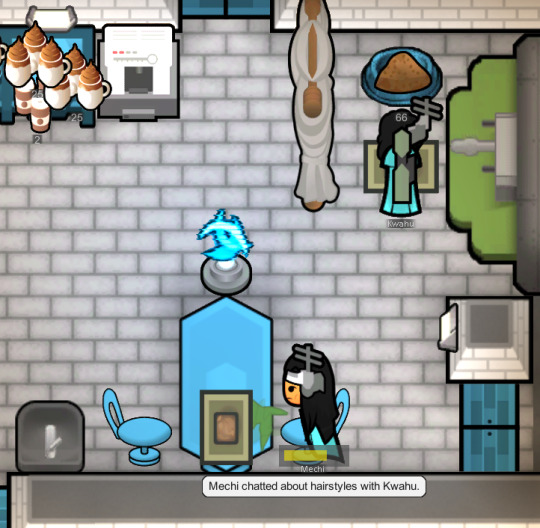

It's a nice thought, Mechi. Eventually, though, we do want you two to be matchy-matchy with bionics as well, so hairstyles really are the only thing telling you apart.
Besides, Kwahu's hair is pretty iconic at this point, and I like drawing it.
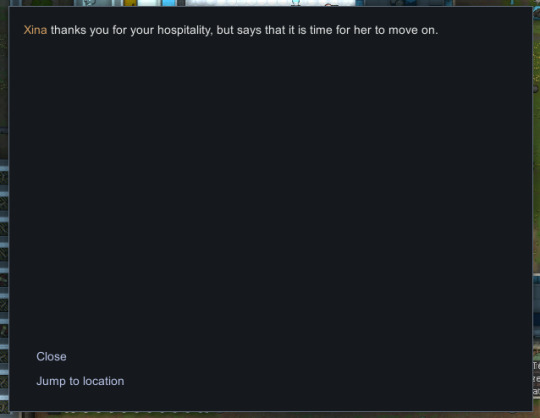

Oh, uh... Bye, I guess. Thanks for hanging out. Don't come back.
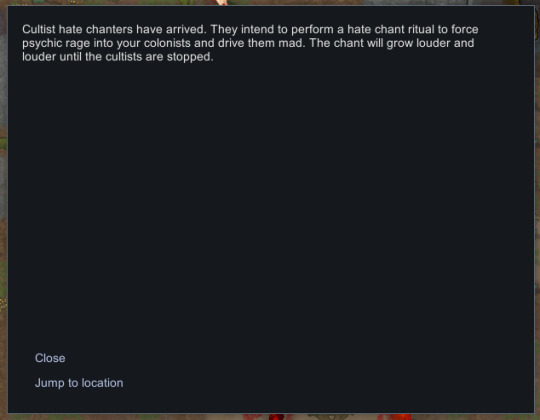

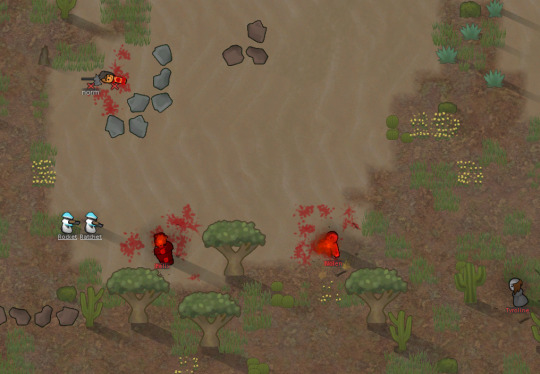
Don't worry, Brandy! You will be avenged!! The perfect opportunity to field-test our bionics.



We're in the middle of fighting evil dog-killing cultists, and bugs decided to try and outmaneuver our killbox (it did not go well for them). Silly bugs.
First | Next | Previous
#rimworld#gracie plays#A Mechanitor's Message#art#my art#traditional art#rimworld art#unpolished art#slightly more polished art than usual#nothing like a nice chat about your hair while enjoying a healthy nutrient paste breakfast#Kwahu's hair will remain unchanged though#I like it too much to let it go#bye Xina#you weren't that much help tbh#thanks for not killing us all or something#unless you DID send those cultist#which I can neither prove nor disprove#so we'll just hope to never see you again#R.I.P. cultists btw#shouldn't have killed our dog#and R.I.P. insects#that was a dumb place to pop up#stupid bugs#have an awesome day!! xoxo
55 notes
·
View notes
Text
there's like a bit of fanon, which i've seen often enough to be notable, that gojo is able to use limitless to basically thermoregulate himself, and thus be relatively unbothered by heat or cold. so i was thinking of that and it of course brought to mind the formation b juju stroll, the one with this moment

where gojo and nobara are just kinda melting in the heat together. and obviously gojo seems to be feeling the effects of the heat, which would contradict the fanon, right? now i see three possible explanations for this
1, which is boring and therefore wrong, that this canonizes gojo experiencing temperatures and disproves the idea that he can thermoregulate
2, which is also boring and therefore also wrong, that this moment is a non-canon stroll, and therefore neither proves nor disproves anything, because it's only happening for the sake of a quick joke
and finally 3, which is fun and therefore true, that gojo does thermoregulate, but in this instance nobara is overheating, so he exhibits prosocial mirroring behaviours and acts like he is too. because he's a nice guy who cares for his students
#i need to come up with a tag for when im making funny about jjk#for now im gonna use.#jujutsu karden#real blog lore knowers will chuckle at that
67 notes
·
View notes
Text
Following up on my last post, the SotET story trailer and the Minor Erdtree description both suggest that Marika's village was completely wiped out, slaughtered down to the last soul. I've also seen other posts suggesting that the wounds on Marika's arms in the trailer look like they could have been made by the tooth whip. Which begs the question, how did Marika escape sharing the fate of her people?
The hornsent potentates who oversaw such massacres wore Caterpillar Masks, which were meant to ward of "wickedness" such as, among other things, doubt.
I have yet to see any lore regarding how the misbegotten fit into hornsent society, or whether misbegotten even existed as a species so early in the timeline. So I can neither prove nor disprove that Hewg could have been alive that far back.
This is really more of a fic idea than a proper theory, but I'm currently obsessed with the idea of Hewg being a guard or an assistant to a potentate, or maybe even a potentate himself. In an act of pity, he allows a traumatized young shaman to slip away from the ensuing massacre, saving her life. When she returns years later as a vengeful god, she spares him in turn.
Wouldn't that explain the blend of terror, reverence, indebtedness, and genuine devotion that Hewg seems to feel for Marika in the main game? He saved her life. She saved his. He witnessed the utter destruction of his people and culture at her hands. As a former potentate/potentate-adjacent, a part of him acknowledges that Marika's vengeance upon the hornsent was a twisted brand of justice. And yet he's had to live all these centuries with the knowledge that, had he smothered that fleeting flicker of compassion, the avenging angel who went on to massacre his people would have been jar meat.
91 notes
·
View notes
Note
Hiii!
I was wondering how the rooms were distributed in each dorm. I know that the housewardens have their individual room but i believe that in Hearstabyul Ace and Deuce share their room with other 2 students and in Octaville Jade and Floyd share a room, so i guess it's different in every dorm and i wondered how It was in other dorms and if there was any information abt the roomates.
I rlly like your posts, it's rlly cool learning more abt TW lore and characters.
Hello hello!! Thank you so much, you are too kind! ♡ And also thank you for this ask, it was so interesting to look into!
Some room situations have been confirmed via dialogue while others have not, there are various theories based upon the cross-referencing of dialogue, graphics and the novel, and something curious might be going on with EN-server's Octavinelle:

First-year living situations are referred to at least twice as being four-man rooms. As this information comes from Ace and Deuce it seems not uncommon for people to assume that this must be Heartslabyul's particular setup, but neither character ever specifies that this situation is unique to Heartslabyul: they say it is specific to first-year students.
And the rooming situation at NRC is described explicitly in the second novel:
"In each dorm 1st-year students are four to a room with 2nd-year students two to a room and, as a 3rd-year student, you finally get a room to yourself.
Housewardens are the one exception, with their own room regardless of year."
So it is possible that roommate arrangements are the same across all seven dorms. But! Many things have been changed in the novels from the original game (Leona's introduction, the prefect going to Pomefiore alone, etc), so it might be better to not use the novels as a reference for what is or isn't game-canon. This neither proves nor disproves the possibility of the game following the same roommate system, but it does give us something to go off of :>

Ace and Deuce were hinted at having the same bedroom in a vignette, and this was confirmed during Spectral Soiree when Ace says he can hear Deuce grinding his teeth in his sleep.

Comparing their bedrooms themselves, objects from Ace's bookshelf can be seen in Deuce's room.
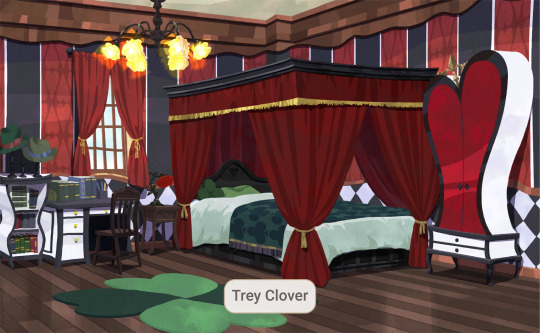

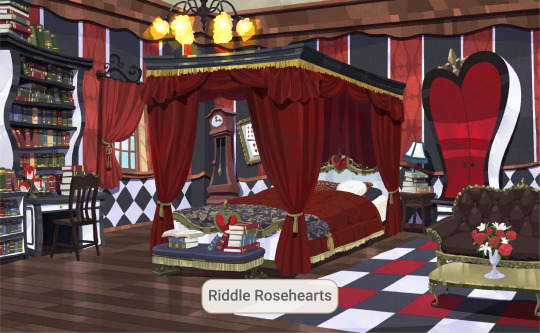
Unlike the overlapping objects in the Ace/Deuce shared bedroom, there is no proof of Cater, Trey or Riddle sharing a room with anyone, which may support the "third years and housewardens have private rooms" theory.
Further support comes from Cater's comment that he and Trey only shared a room for their first two years at the school.

This might point to them sharing a room with two others in their first year, having a room alone together their second year, and now they are in private rooms.
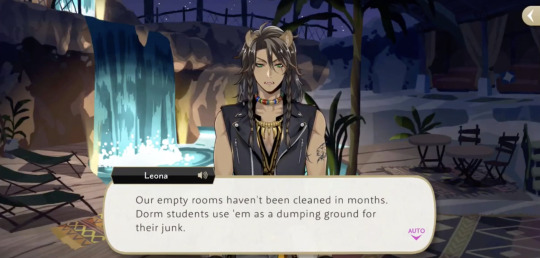
There is an interesting situation at Savanaclaw where they have empty rooms in the dorm, but students are still rooming together rather than cleaning out a room to use for themselves.
It is possible that "first-years are four-to-a-room, second-years are two-to-a-room" is a rule at the school. Only some first- or second- years getting private rooms or fewer roommates wouldn't be fair to the others, so they have to share rooms even though there is space available.

Leona has a line about Ruggie sharing a room with at least one other person during Spectral Soiree, so Ruggie having a roommate is also confirmed.
(The Japanese language doesn't really have "the" or "a," and EN chose to write this line as "a guy in his room," as though there are multiple people besides Ruggie. It could technically be interpreted either way.)
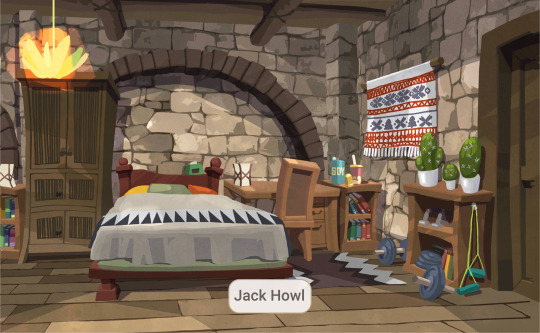

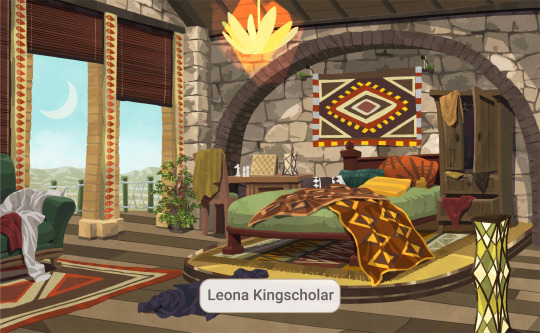
Much like Ace and Deuce, illustrations show proof of other people living in Jack and Ruggie's rooms, while there is no such proof in Leona's.


There is also no visual proof of Azul sharing a room with anyone, while there is proof in Jade and Floyd's.
Based on visuals alone it seems there might be an argument for the twins sharing rooms with other people: the positioning of the chairs and a stack of books in Floyd's room do not seem to correlate with Jade's room. A stack of objects in Ace's room can clearly be seen in Deuce's room, so it seems like such details would be carried over if that's what we're supposed to think is going on.
But, unlike most other characters, it has been confirmed in dialogue that Floyd and Jade share a room on JP!

The Japanese language doesn't really use possessive pronouns in the same way that English does, as things like that are generally communicated via context.
Since English forces you to specify such information (which Aniplex USA might not actually know), they added "Jade's room" to Floyd's dialogue in his birthday vignette, despite how Floyd did not specify Jade having a separate room at all: he just says that Jade is always keeping an unspecified room clean. While he could technically be talking about Jade's room, he could also be talking about their shared room.
This is a kind of vague example and may not be particularly convincing either way, but there have been at least two more references in-game:

In Floyd's original, in-game dialogue, he says that he doesn't want to go back his room because he wants to be alone, but Jade will be coming home soon. The word "room" was changed on EN to "dorm," not once, but twice:

In another vignette he says that Jade smells so earthy all the time that it brings his mood down just to be in the dorm room. So I think I can understand someone playing EN and thinking that the twins might be in separate rooms with different roommates, but that does not seem to be the case!


Much like Riddle, Leona and Azul, there is no proof of roommates in the bedroom illustration for Kalim, but another student's rug, bookshelf and desk can be seen to the side of Jamil's despite how he is a vice-houswarden. This may be in support of the "two students per 2nd year bedroom, housewardens are the only exception" theory.
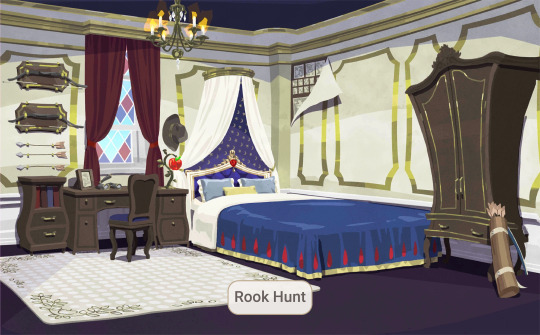


Neither Rook nor Vil have any proof of roommates in their bedroom designs, while what may be another student's closet can be seen to the side of Epel's.

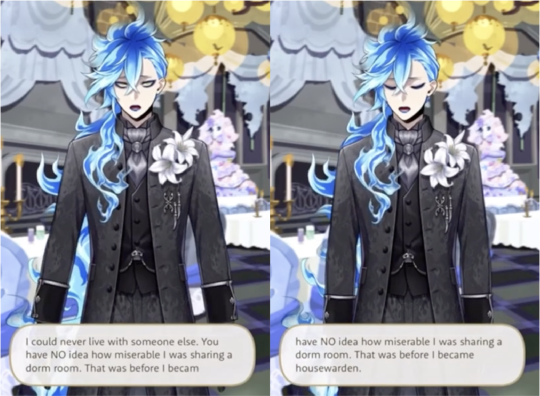
There is no proof of a human roommate in Idia's bedroom (the blue stand off to the right is heavily hinted in Book 7 as being for Ortho), and he has a voice line about being miserable sharing a dorm room until becoming Housewarden.

Despite being counted as a first-year student (while he has technically been at the school as long as Idia), post-Book-6 Ortho's room also does not seem to have any proof of being a shared space, but it was confirmed in New Years 2024 that Ortho does have multiple roommates.
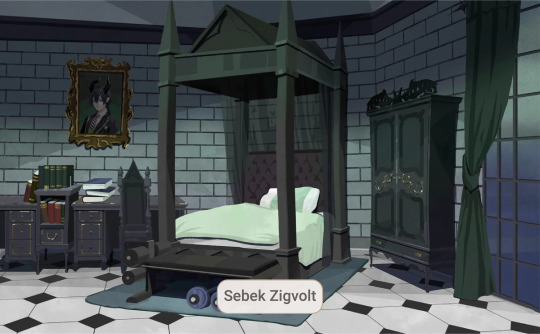

There is proof of roommates in both Sebek and Silver's room illustrations, with what are presumably other students' desks seen in both of them.

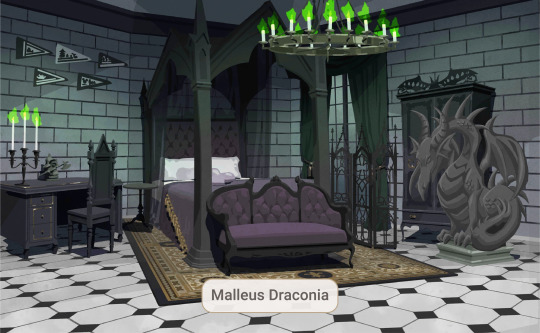
There is no proof of roommates in Lilia or Malleus' bedrooms, and we learn in Spectral Soiree that their two rooms are located next to one another:

138 notes
·
View notes
Text
Nosferatu (2024) takes its Occultism at least as seriously as it’s cinematography.
Exhuming the Spiritual Assumptions
Spoilers ahead (naturally)
One of my guilty pleasures is The Exorcist Files podcast. I don’t really buy into its extremely Catholic spiritual warfare worldview. I am at least a little bit skeptical about the veracity of the stories being recounted. I am both Scully and Mulder on the occult. I find it endlessly fascinating and am very much willing to engage with believers seriously and respectfully but try as I might to develop any sort of consistent religious or spiritual practice, in my core I just don’t exist in the demon haunted world. I believe there are more things in Heaven and Earth than are dreamt of in my philosophy but it’s all so very ineffable to me instead of inerrant.
Right off the bat (or as Matt Berry would say: BAT!) that leads me to my first complication, caveat, and interpretation. Namely that the very heavily Catholic informed worldview of the Nosferatu setting may just be the framework that the characters are using to understand what is happening. This being a variation on The Dracula tale more or less played straight, the audience also would tend to bring that assumption with them. However! I think the role of Willem Dafoe’s character is to push back on the reflexive assumption that capital E Evil exists as a supernatural force therefore Christianity is empirically correct.
Nosferatu weaves around a couple of assumptions largely by neither proving nor disproving them. The trope of a Vampire being repelled by the cross for instance is never tested. The people living in proximity to Orlok’s castle clearly believe this but for all we know they are only situationally free of his power because he has no specific desire to hurt them. Same with hallowed ground. The priests and nuns believe Orlok cannot threaten them but is it beyond question that Orlok actually wants to finish off Thomas?
A couple of recurring themes in demonology are legalism and the need for witnesses. Orlok covets Ellen but his mind has become fixated on dissolving her marriage to Thomas and her willingly giving herself over to Orlok. For the most part the Abrahamic religions treat evil as something that must be chosen. A good many millennia of spilled ink, schisms, and even spilled blood has centered around the question of what it really means to choose and the definition of informed consent. For Orlok’s purposes Ellen seems not to have had sufficient agency to properly choose as a legal child in her society but he could court her until she came of age to be legally and metaphysically responsible for her choices. Alternately it’s possible age was irrelevant and he instead simply lacked the means to bring her to him or go to her until he established a connection with an occultist who had the resources to arrange everything.
Regardless, to some degree Ellen must have agency but Orlok can leverage her by threatening her loved ones including Thomas. Once he escaped the castle, Thomas was more useful as leverage alive and given the belief of the exorcists that Orlok still had influence over Thomas, Orlok may even have subtly pushed him to return home to make it easier for Orlok to locate Ellen if she continued to reject his overtures and collected herself enough to shut out Orlok as she had up until Thomas’ departure. Orlok certainly didn’t put a lot of effort into ensuring that Thomas was really dead and one interpretation of Thomas’s experiences with the exorcists is that Orlok would have been aware that Thomas was alive and could track him down in the material world if he really wanted to badly enough.
Evil’s Prime Directive: Likes, Shares, Subscribes
Which does bring me to witnesses. In Christian demonology specifically while Evil hates Creation generally and Humans in particular, destruction and ruin for its own sake is rarely a primary goal. So while Orlok as an alleged disciple of Belial in life and probable demon incarnated into a body (more on that later) desires to reap Ellen’s soul and brings along an army of plague rats for good measure, there is no point to any of this without survivors to bear witness.
Destroying isn’t enough though, the true objective is to get people to doubt the existence of a just and loving God. According to some like Father Martins of Exorcist Files fame, through a lot of hand waving the real real objective, as dictated by an all powerful God, is to use Evil to remind people that little sins lead to mortal sins and thus they should stay on the straight and narrow and remain under the protection of God.
This is where my inner Crowley would say “And you call me the bad guy!” while Aziraphale throws up his hands and says “It’s ineffable but it must be good, because God is good.” Which is how the formerly henotheistic Israelites and their descendants wind up quietly reintroducing dualism into their monotheism by retconning most of their God’s more wrathful deeds as having actually been the fault of a certain ex-prosecutor turned eldritch terrorist and his gang of personified concepts of wickedness and a few pagan gods who got laid off when their pantheons underwent consolidation and “right sizing.”
Ahem. Sorry. I’m being cheeky, I actually think it’s all very interesting and as a consequence I lose patience with people who don’t understand the history of their beliefs but not because I want to refute them but because how is it not fascinating?
So since Evil’s prime directive is to have someone acknowledge how cool and awesome it is, Orlok wouldn’t view Thomas as a loose end. If Orlok doesn’t need to kill Thomas, then Thomas would be in some sense an accidental missionary. While the Romani hunt vampires and try to warn unwary travelers, their apparent willingness to try to, if not mollify then bait, vampires is useful. Their belief in a supernatural evil and the specific customs they have developed to protect themselves also separate the Romani from more “sophisticated” people whose lack of direct contact with monsters and overt magic cultivates a sense of superiority over superstitious peasants. The maintenance of plausible deniability is also a practice attributed to Evil.
Up to this point I’ve tended to describe Orlok in largely stereotypical demonic terms. The reason being that Orlok presents very different in many respects from more traditional representations of Dracula and even the more bestial depictions of vampires. Orlok himself identifies as “an appetite” when Ellen questions whether he is even capable of love. You are free to read melancholy into this if it suits you to humanize Orlok. I myself view him as a being with very little humanity and is more of a set of base urges with the ability to develop somewhat sophisticated plans to serve those urges but there is little to nothing about him that is able to stray too far from his hungers.
There’s one other scene where I think you could argue Orlok shows a bit of humanity and it’s perversely when he’s being maximally petty. That being when he insists on being addressed as My Lord. As an alleged disciple of Belial, this has a metaphorical meaning and a literal meaning. Belial is an example of one of those concepts that got personified over time as subsequent generations translated the original texts and added their own flourishes. Originally Belial was a description. A slur even. It meant to be worthless. So Orlok in pledging himself to Belial has in some sense given himself a cosmic demotion when his earthly rank was count. Which he would have almost certainly thought was also a divine mantle.
Being a vampire seems like the sort of thing that might seem like a promotion but there’s a lot of suffering that comes with it. More so than the classic Stoker or Anne Rice version. For starters to the extent he is even still the same person, he’s Damned with a capital D and that is portrayed as sucking a lot in the Abrahamic framework. Just the knowledge that they can never be in Heaven or in the presence of God is supposed to be a torment but that tends to get deemphasized because it’s not as relatable a motive for wanting to ruin the world when the audience is flesh and blood and maybe asks uncomfortable questions about global floods and why have a fruit bearing tree if you don’t want people to snack.
So let’s remember why Vampirism sucks in other ways:
There’s an argument to be had about whether he’s a damned ghost haunting his body that hungers for blood as a condition of his continued existence: the feasting upon blood and his other comorbidities being the burdens he must accept for extended life. Life beyond death in an embodied state for humans being a fundamentally unnatural state and thus requiring sacrifice to maintain the equilibrium of nature. So he makes periodic blood sacrifices and in doing so, is alienated from society still further as if being a literal corpse that cannot abide the sun was insufficient.
My own feeling is that the glimpses of Orlok the person may just be the semi petrified remains of the memories in that body, a body being used by an avatar of the Deadly Sin of Gluttony. The vacated body of a former disciple of Belial being a compromised vessel but one that allows more exercise of power over the natural world by virtue of being so alienated from the natural world and obligated by its hungers and nature to confine its activities to a fairly limited range: it can do almost anything it wants towards spreading terror and ruin but can’t take a night off to enjoy a play.
This entity likely being a demon and not being capable of appreciating art or beauty for its own sake. Orlok or the entity wearing his bones didn’t fall in with the wrong crowd and vaguely saunter downward. Traditionally Abrahamic demonology doesn’t allow for demons who are merely just kind of bratty and ask too many questions, blurry lines between good and evil tend to invite a return to henotheism or, gasp, polytheism. A thing other Christians have been accusing those who pray to Saints of for centuries. This is not me implying Catholics are polytheistic mind you, I don’t have any stake in delegitimizing Catholicism and even if I did, treating polytheism as a slur wouldn’t be the hill I’d die on.
A Chronicle of a Dim World but Not Necessarily Pure Darkness
I did say though that I think Christianity was possibly not empirically correct in Nosferatu but rather the framework that everyone involved was interpreting things through. Everyone except Von Franz. Okay I’m just going to refer to him as Willem Dafoe from this point on because he’s such a Willem Dafoe character. He doesn’t automatically assume Ellen is crazy nor does he blame her for anything. His comment about how she could have been a priestess of Isis in another age I think is very revealing about where he draws his ethical lines. I think it’s implicit that he doesn’t think it’s Ellen’s fault a malevolent presence latched onto her when she seemed to have a natural gift for walking the spirit realm in dreams but absent any tutelage or cultural context for managing this ability.
By the Christian paradigm, Ellen has messed up big time and probably irredeemably. Traditionally it’s not good to have dissolved your marriage and pledged yourself to a demonic being whom you then perform a pseudo sex act with. The Abrahamic religions, as traditionally practiced, aren’t very sex positive when it comes to women nor is there much of a concept of spectrums of consent and coercion invalidating sexual and spiritual relations. Traditionally practiced is a phrase doing a lot of work and oversimplifying a lot when it comes to thousands of years and billions of practitioners. Norms obviously varied quite a lot across eras and regions.
Dafoe taking up her cat and staring into the dawn though is rich in hopeful symbolism. Cats got a bit of a bad rep in certain periods due to their tendency to be looked upon fondly by pagans. On the other hand, they were often looked upon fondly by pagans. They’re often portrayed as wise and associated with magic. Plus, and this matters in the context of a plague spread by rats, they eat vermin. If the bodies are piling up, stray cats are on the side of the angels doing their part for humanity one meal at a time.
Given how much Ellen adored her cat, one could say perhaps it’s invested with a measure of spiritual power and is more than just a symbolic surrogate for Ellen. Regardless, I think the context points to Ellen’s sacrifice being both literal and metaphysical. She sacrificed her life and also nullified her sins too. So Van Hellsing, I mean Von Franz may be visually representing a spiritual intercession where Ellen has been snatched away from the Pit.
To get a little Gnostic, Willem Dafoe may be basking in the light of knowledge. He’s seen behind the veil, made testable assumptions, and proven them. Ellen is being taken up to Heaven, Orlok is back in Hell, and Hermes Trismegistus is proud of his star pupil. Although this is truly Ellen’s tale and Ellen’s victory while Willem Dafoe believed in her and kept the well intentioned white knights from getting everyone killed by interfering with an unorthodox solution they’d no doubt object to on the basis that it was super icky. Although in their defense, I consider myself a pretty enlightened 21st century man but I’d probably try to talk my partner out of it and be a bit of a pest if she told me we needed to get divorced so she could shag a demon to death to save not just my life but the lives of untold thousands.
In the finest tradition of horror heroines, Ellen was a hard woman making hard choices and in sacrificing herself she took a groomer demon of pestilence and hunger with her.
And maybe, just maybe I’ve over complicated all of this and it’s just a metaphor for how bad women have it with online dating where the astral plane is the apps and Orlok is a creepy dude who becomes obsessed after an underage girl is nice to him once.
Epilogue: Again, with all due respect to the character, this would have been my humble suggestion for a hidden bonus track on the soundtrack.
#nosferatu#nosferatu spoilers#nosferatu 2024#occult#demonology#amateur theology#vampires#analysis#willem dafoe#lily rose depp#count orlok
13 notes
·
View notes
Text
Okay... so about that RadioTimes article
I was gonna make a post about this earlier and I didn't because I didn't feel like my thoughts were in a place that didn't come off as
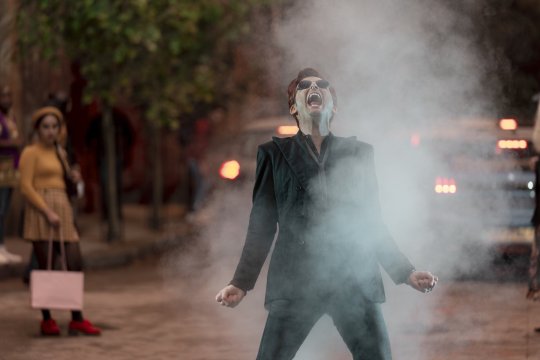
But I think I've got my thoughts somewhat together, so I'm just gonna drop my (admittedly unnecessary) two cents on the whole thing.

"Imagined romance"
My question to whoever wrote this: have you watched the show and/or engaged with any other interviews involving cast/writers?
Not only is it (sometimes obvious) subtext in the show, but it's been confirmed by actors and writers alike. You don't even need to do much digging to find out about it. To me, it feels like it feeds too much into this idea that you can only have a romance if it's explicitly mentioned/shown through physical intimacy, which it doesn't! The show actually depicted a healthy, loving relationship between two beings without physical intimacy only for the fans to be publicly labelled as somewhat delusional for seeing it.
And then there's this bit...


(I'm saying this as a cishet female, so please jump in with corrections/added context if needed).
This made me feel incredibly weird when I first read this because the quote used didn't seem to be proving much of the point they were making. Putting aside the absurdity that is "resisted pressure to give in to the fan-fiction phenomenon", the fact that they immediately jump to using a quote about the characters' understanding of gender as proof of there being no romance feels so odd.
Am I just misinterpreting this whole section or something because the entire thing seems to be saying "Gaiman disproved the fans' delusion of an imaginary romance by confirming that neither Crowley nor Aziraphale understand the human concept of gender" as if the characters being gender non-conforming is proof that they aren't romantically involved?
Like, are we running with the idea that a romance can only be built between two people who each conform to a specific gender category? Someone please correct me if I'm wrong because I am genuinely baffled.
Or are they trying to say that they don't understand human concepts like gender and are therefore also unlikely to understand romance? (Edit: But even if they don't understand the concept of romance, surely that doesn't exclude them from experiencing those feelings). Or did they just pull a random quote that didn't quite work because there isn't actually one of Gaiman explicitly saying that there is no romantic connection?
Other than the last two paragraphs, I actually found the article to be quite interesting. But the end left a sour taste in my mouth.
On the plus side, we did get this gorgeous pic today. 🩵

Like I said earlier, please add corrections or context if necessary. Or just drop your thoughts in general. I know people were taken aback a bit by the article and while I don't think there was malicious intent or anything by the writer, it feels misguided.
But enjoy the Ineffable Husbands sitting on a rock together because it's a gorgeous photo.
#not aure if i'm gonna keep this up#it still feels a little ranty#but the last part of the article genounely left me baffled#good omens#good omens 2#ineffable husbands
75 notes
·
View notes
Text
And If Thou Wilt, Forget: a TMA fanfic
[1] || Also on AO3 and my personal website
Chapter 2: What, neither choose nor wish to choose?
So far, the biggest difference between archiving and publishing seemed to be that the documents he had to read were shorter.
Tim’s particular job at the publishing company had been fact-checking, doing supplemental research on the manuscripts that came across his desk, and Lou had always given him the tricky ones because, she said, he was a master at tracking down unusual or hard to find subjects. He didn’t know if Ms. Robinson had actually called Lou for a reference, especially since she’d hired him without even looking at his CV, but she’d certainly given him plenty to do, and she’d stopped checking behind him after the first week. Mostly it consisted of making phone calls or looking things up on the Internet, but occasionally she sent him up to the library for a book or two, and on one or two occasions she’d taken the stack he’d brought her, delicately sorted through them, and handed him a couple which turned out to be about Robert Smirke or circuses or something similar. He’d come to take it as a sign that he wasn’t needed for a few hours and could work on his own research.
He wasn’t that much further along in it, but it had only been a couple of months, after all.
There was so little to go on, even less on some of the more…salubrious ones. It hadn’t taken Tim long to realize that the less information he was able to get, the more likely a statement was to be real. Of course, in some cases—like this one—it was equally as likely to be down to the age of the incident as to any grain of truth to it. Something about this one got under his skin, though. He’d found it accidentally while poking around and read it on a whim, and curiosity and a deep-down feeling of anxiety had mingled to cause him to keep looking into it with a dogged perseverance. Somehow, the fact that there was so little to go on had only made him more determined to find something, anything, that he could prove or disprove.
And he had something. Finally, he had something. With a few words of thanks and promises to meet up for drinks if they happened to cross paths on a weekend holiday again, Tim hung up the phone, scribbled a final note on his page, and gathered statement and research, then stood. He crossed over to the Archivist’s door and tapped a rapid-fire shave-and-a-haircut against the frame.
Ms. Robinson peered up at him over her glasses. She looked faintly annoyed, but Tim wasn’t deterred; he’d learned by now that she had a sort of perpetually grumpy expression, and was fairly certain it was put on. “What is it, Tim? It can’t be five o’clock already.”
“Technically correct, if you’re talking about five o’clock in the morning, but it’s actually closing in on eight. I, uh, I lost track of time a bit.” Tim stepped into the office and held up his papers. “Just wanted to bring you this. I think I’ve hit the limits of what I can research on it, unless you’ve got other places I can look for ancient history. But I don’t think this one’s a fake.”
Ms. Robinson’s eyes focused on the papers, and she held out a hand. “Let me see.”
Tim handed everything over. Ms. Robinson—at first—ignored the research and focused on the yellowing pages of the statement, torn or cut from an ancient journal. Her eyes seemed to glow as she read. She reached the end and opened her mouth to say something, then stopped as she noticed the subsequent pages. “What’s all this?”
“Corroborations, explanations, verifications…that kind of thing,” Tim answered. “You know. There’s a description of how the Mechanical Turk actually worked, or supposedly worked anyway, and a few other experiments Wolfgang von Kempelen was working on that allegedly never saw the light of day, a couple of which got mentioned in that statement. Some research on the Court Theatre in Buda, or at least what’s publicly known about it. Some research on Abraham Janssen himself—he didn’t last long after writing that entry, maybe a couple of months, but he seems to have gone out naturally enough. And I managed to track down a report of a description of the incident given to a nurse at one of the local hospitals by someone who didn’t survive their injuries. The full report is on its way, but from what my contact said, it tallies with most of the major points.”
Ms. Robinson looked at Tim sharply. “How did you find the report?”
“A guy I met backpacking the Carpathians on holiday a couple years back teaches anthropology in the biggest university in Budapest,” Tim answered instantly. “We’ve kept in touch. I reached out to him to see if he knew anything about this incident, and he tracked down what he could for me.”
“Hmm.” Ms. Robinson returned her gaze to the papers. “I must admit, that is a boon we don’t normally get with statements of this type.”
“Meaning ones this old, or this weird?”
“I think a more appropriate word might be…Strange.” Ms. Robinson stared at the statement for a moment, then seemed to come to some kind of decision. “I have a new assignment for you, Tim.”
“Sure, that’s what I’m here for,” Tim said easily. Inside, though, he felt a surge of pride he hadn’t expected to ever feel again. She trusted him, trusted he would be able to find things even if they were difficult. He’d earned that. He’d earned it at the publishing house, too, but somehow that trust weighed more, coming from Ms. Robinson.
Actually, that part wasn’t a surprise. In the eight weeks since he had been hired, Tim had had discussions with more than one employee, albeit not very long ones. The Archives were a world unto themselves, and very few people interacted with Ms. Robinson on a regular basis. Several seemed to be of the opinion that she’d likely gone a bit strange after losing her last crop of assistants. One or two had warned Tim to watch his back in tones that could not have said I’m being very serious but I will play this off as a joke if anyone tries to make me swear to it more clearly if it was spelled out in graven letters. And he’d seen more than one look at him with the sort of expression he equated with a giant looking at a small girl prattling excitedly about a party she had no idea she was meant to be the main course for.
Still…Ms. Robinson trusted him. She’d hired him on the spot and she’d let him start the work right away, and she was honest about his mistakes but also about what he was doing well. Maybe everyone expected her to turn on him at a moment’s notice, which would at least explain why her last crop of assistants had all, evidently, quit at once and without warning (probably why she’d insisted his was an appointment for life), but he hadn’t seen any evidence for that. He liked her—better than he liked most of the people he’d met upstairs, anyway, barring one or two—and he didn’t see any reason to regret being down here.
Yet.
Ms. Robinson pulled open a drawer in her desk, talking as she did so. “Are you familiar with the name Mikaele Salesa?”
“Not ringing any bells. Should it?”
“Not necessarily. How about Jurgen Leitner?”
That one did tug at Tim’s memory. “Wasn’t he a book collector or something? Weird or…esoteric topics or something like that? Lou used to occasionally say that some of the manuscripts I was looking at would have interested him.”
“Unlikely. Leitner collected rare books. Very rare ones.” Ms. Robinson retrieved an unsealed brown envelope and handed it to Tim. “Salesa is, or was, perhaps, his counterpart when it comes to artifacts. He had a gift for both locating them and acquiring them at a reasonable price. However, he is…unavailable at the moment.”
Tim took the surprisingly heavy envelope, but didn’t open it. Something told him to wait. “Do you need me to track him down?”
Ms. Robinson hesitated. “I suspect you would find it a challenge. No, what I need is the artifact described in that envelope. It may be essential to my—to our work. I was finally able to get a line on its location. Unfortunately, I am…known to many of the people who may have it in their possession.”
“Ah.” Tim nodded in understanding. “And they’ll charge you more than a fair price because they know you need it.”
“Quite. Which is why I am sending you to the Night Market to acquire it for me.”
Tim weighed his options. He didn’t want to walk in blind, but he also didn’t want to look like he needed her to hold his hand for him. Still…“I assume most of my questions will be answered by what’s in here, but to start with, how do I find the Night Market?”
“Carefully,” Ms. Robinson said, gravely and without a hint of humor. “I’m afraid I don’t have an exact location, but it’s somewhere in London, along the banks of the Thames. It generally runs between quarter moons, beginning when astronomical twilight gives way to true night and ending when it returns to twilight.”
“So I’ve got time to find it, in theory, but in practice this…whatever it is…is likely to shift sooner rather than later,” Tim guessed.
“It’s a possibility, certainly. And I would prefer this not hang around more than necessary.”
Tim nodded. “Right. See you in the morning then.” Before Ms. Robinson could say anything else, he saluted, turned on his heel, and left the office.
He wasn’t stupid. He knew this was a test, even if Ms. Robinson hadn’t said so outright. Asking too many questions would bring him down in her estimation, and while he knew this errand probably wasn’t all that serious or important really, he needed to treat it like he’d been sent to retrieve an idol for a university museum.
Lucky thing he’d worn his fedora.
The night was cool, the sky was clear, and the moon was a waning crescent two days away from new. Tim made his way to the nearest bridge, then stopped in a convenient shadow that still afforded him enough light to see by and pulled the packet out from under his jacket, then opened it up and peered inside.
The first thing he saw was a stack of bank notes, older and well-used from the looks of it—presumably his budget for obtaining the artifact, whatever it was. He pulled it out, tucked the packet under his arm, and thumbed through the stack. His eyes widened. Jesus, there was easily a couple thousand pounds in here. That was almost more money than Tim had ever seen at one time in his life. And this was the so-called “reasonable” amount Ms. Robinson thought he could get it for? Christ Almighty.
He tucked the money back into the envelope hurriedly and pulled out the other piece of paper. It was a slightly faded photograph of a small, ornate figure of a bird, made up of a few different metals—he couldn’t tell quite what kind—interspersed with either glass or a very fine enameling, with a delicately scrolled key in its back. For a moment, his stomach flipped uncomfortably, thinking of the description in the statement he’d just researched of the caged mechanical canaries, but he got hold of himself quickly. This was more than a simple toy, and not something that could have been produced in quantity, of that he was sure. The lines written at the bottom of the page confirmed it; it was an Art Nouveau piece, created a good quarter century after the death of the Mechanical Turk, one of a kind and therefore of value to the kind of people who thrilled from owning something that nobody else could but not, Tim thought, worth particularly much overall. It was pretty, certainly, but there was no maker’s mark, no known provenance, no storied history—or at least not one on the paper he held. He didn’t doubt for a minute that a particularly good salesman might be willing and able to spin a story to up the price, but it would all be vague and difficult to prove or disprove; possibly true, but most likely a trap for the gullible.
Tim slid the envelope back under his jacket and studied the Thames for a moment. Half-remembered mnemonics and bits of folk wisdom he’d learned from his nonno, his mother’s father, a vintner and wine-maker who still walked behind his plow in the spring and plucked each grape by hand, floated through his head. He took a step back, stared up at the sky, murmured a few calculations under his breath, tilted his hat to a jaunty angle, and set off purposefully.
About two hours later, he rounded a bend in the river, paused, slipped around a shadow, and grinned as the soft murmur of a bustling crowd rumbled in his ears. Bingo.
It couldn’t be anything but the Night Market. Hooded lanterns swung beneath canvas awnings, not so much illuminating the wares spread across the booths, or the people manning them, as giving texture to the darkness. Very few people carried torches or any other form of light, and most of them wore dark clothing just shy of actual holocaust cloaks and domino masks. Other than that, though, it was, well, an ordinary street market. The air was full of the murmur of voices and the scents of roasting meet and spices, vendors calling out to passersby and people attempting to haggle. It was oddly muted, but still, Tim was a bit surprised he hadn’t been able to hear it from up closer to the street.
He also wasn’t sure how this all fit in the space between the sidewalk and the river. Was this area usually here? Part of him scolded himself for being silly—of course it was normally here, space didn’t just appear and disappear.
The rest of him reminded that part of his brain that nobody else seemed aware of the entire fucking stone theater beneath the Royal Opera House. It wasn’t like he didn’t believe in this stuff; he did, explicitly, that was why he was here, why he worked for the Institute. But sometimes it just seemed…easier to reach for the simple, mundane explanation. Certainly safer.
But he knew what the world was like and he knew what his job was, and he wasn’t going to keep Ms. Robinson’s trust if he tried to be a skeptic. It was time to set aside the Sherlock Holmes axiom—that when you had discounted the impossible, whatever remained, however improbable, must be the truth—and start living up to the Dirk Gently point that the impossible often had a kind of integrity to it that the merely improbable lacked. Or, to put it in the words of a movie he’d only allowed himself to be dragged along to repeatedly because he’d had a crush on both Orlando Bloom and Keira Knightley at the time, he’d best start believing in ghost stories—he was in one.
Slipping into an out of the way corner, Tim pulled out the paper again and studied it, committing the details to memory. Then he folded it up, stuck it into a pocket nowhere near the envelope, his wallet, his keys, or his phone, and ventured into the Night Market.
The light, or lack thereof, was doing funny things to his imagination. The items spread across one booth looked half-rotten, the ones on another dripped with blood, an appetizing smell came from a pot that seemed to contain a human head…but then he blinked, and the rotten objects became decent if old knickknacks, the bloodstained objects were pristine, and what had looked like a head proved to just be a lid that was replaced as a vendor handed over a bowl of some sort of savory stew. Tim’s stomach grumbled, reminding him that he’d worked through lunch and long since missed supper.
Still, he gave that particular booth a miss.
He kept ambling, trying to appear as though he had no particular purpose, but always with an eye out for a booth that was likely to contain that clockwork bird. None of them looked right. None of them felt right, either, but Tim was starting to get a headache; the more he walked, the more difficult it was to actually make out what was on the booths, and he didn’t think it had anything to do with the lighting.
He slowed thoughtfully as he approached a crossroads. Some of the statements he had read and investigated, the ones he’d been convinced were real just from how little they had to go on, had had a common theme in them: the people giving the statements had always seemed surprised, then worried, that no one else seemed to see what they did. A few had seemed convinced they were experiencing a psychotic break of some kind, schizophrenia or bad drug trips or just general hallucinations, but others had known they were the only ones seeing the truth. Tim had a pretty good sense of when they were right and when the statements were actually delusions. This didn’t feel like a delusion.
What if he was seeing things right?
Tim took a quick, silent breath, held it for a moment, and exhaled slowly. He tried to release his preconceived notions with the air, to allow himself to look at the shadows and not the light. To see what was really there instead of just what he was expected to see.
He closed his eyes.
He opened them.
The booth right on the corner, which had appeared to contain an assortment of lopsided Christmas ornaments, now held neat rows of crudely carved wooden dolls. At first glance they seemed nondescript, with dots for eyes and a crooked smile, but as Tim got closer, they seemed to shift into unique, easily distinguished figures. As he watched, the nearest one wavered, then resolved itself—still with the same blank, crudely carved face—into a clear effigy of Gertrude Robinson.
It took everything Tim had to keep his face blank and slide his gaze towards the next figure, which slowly became Elias Bouchard. Something told him that pretending he didn’t recognize them wouldn’t work. The only sensible thing to do was cut his gaze away and walk away. He could feel the vendor’s eyes on him, but didn’t dare turn to look.
Being able to see, really see, what he was looking at…well, probably should have made him run screaming from the market, honestly. (Were those eyeballs? Those were fucking eyeballs. The way they seemed to swivel to follow him could probably be explained by the liquid they were suspended in, but how the hell had that one blinked with no obvious eyelids?) People who could see this shit and didn’t were probably not exactly model citizens. Tim tried to keep his expression neutral like most of the people who clearly didn’t know where they were, but he passed one of the food vendors and couldn’t stop himself from flinching as the tongue on the end of the stick flicked in the direction of the unsuspecting tourist reaching for it.
Then he spied, out of the corner of his eye, one of the vendors watching him with a sharp, almost feral smile that melted into polite attempts to interest passers-by in his offerings the moment Tim obviously gave him even partial notice.
Okay. Actually, he could work with that.
He let himself be obvious. Let it show on his face that what he was seeing was both unexpected and horrific (which was true—he’d expected things like bones and dubious potion components and things of the I swear, Officer, it fell off the back of a lorry variety, not bloodstained knives and shrunken human heads and cuts of meat sliced off a still-warm human corpse). Let his eyes dart frantically around as if in total disbelief that no one else seemed to notice that this place was more than not right—it was wrong.
Most of the patrons were indifferent to him, even oblivious of him, but the figures on the other side of the booths were taking an interest in him. Ironically, he could tell because they never spoke to him. They hawked their wares, beckoned to likely marks, charmed and wheedled and coaxed, but none of them acknowledged Tim except to watch. Most of them did so even while ostensibly talking to a customer, who always seemed completely unaware they didn’t have the vendor’s full attention.
Boy, he was going to have a statement for Ms. Robinson when he got back, and no mistake.
He knew he was getting close when he rushed, or pretended to rush, through a particularly loud and narrow crush of people and around a corner followed by a cry of “Milk! Milk! Milk for the morning bread!” that stirred something in his memory to find himself in a dark, deserted area of the Night Market. It was colder than he had expected, and sound was curiously muffled. He could no longer hear the bustle of noise from the market, but neither could he hear the sounds of London still active even late at night or the Thames flowing between her banks. Still, if he hadn’t read all the statements—if he didn’t already have an idea of what to expect—he might have been fooled, just for a moment, into believing he was safe.
“Lost?” a voice said from—naturally—the deepest shadows.
“Yeah,” Tim said with a deliberately awkward half laugh as he turned towards the voice. “Maybe I should try Hare Krishna.”
His eyes fell on a tall, gaunt figure peering at him from a dusty, tattered booth. Both the booth and the figure appeared to have been buried for a couple of decades before being dug up and planted in the middle of the marketplace. The figure was barely indistinguishable from the shadows it stood in except for its face and hands, which were so pale they almost glowed, but in the center of that face were two dull, black, flat eyes, soulless holes that sucked all the light from around them and pinned Tim in place like a butterfly on a card. Acting frightened didn’t take much effort.
The figure smiled, in a way that was the opposite of reassuring, with too many teeth that were too white and too pointed, and crooked a long, nearly skeletal finger. Tim was pretty sure he couldn’t have disobeyed if he’d wanted to. He tried very hard not to look as though he was pretty sure this was what he was looking for.
He was right. The figure spread its hands wide, palms down, as if unrolling a scroll. Beneath them, on a surprisingly clean black velvet cloth, were four objects. One was a round ceramic mask with disturbingly realistic lips, the blank holes in place of its eyes seeming somehow to follow him. One was a handheld silver mirror, sculpted to look like a hand gripping the glass, which had been carefully placed face-down. One was a light colored box, open to reveal, nestled on a bed of cotton wool, an unremarkable matte black ring.
The final object was the clockwork bird. Even in the darkness, it glittered, the different precious metals making up its body interlocking like delicate feathers. Its tail was raised, its head tilted to one side, and despite being obviously a made thing it was so realistic that he half expected it to take flight.
“Which will you choose?” the figure asked.
Tim hesitated, which surprised him. Obviously, he’d meant to fake that hesitation, to get a better price for that bird, but his eyes kept going back to that black ring. It wasn’t acrylic or stone—some kind of metal, maybe? There was nothing special about it. He could find half a dozen like it at any shop in London. But it…spoke to him. They all held their own attraction or fascination, really, but he wanted that ring.
The trouble was, he needed the bird.
“Is this a one-per-customer kind of thing?” Tim asked, trying to keep his tone of voice light. “Or do you just not think I can afford more than one?”
“The price of all four together is high. Too high for even you, I suspect.” The figure studied Tim, then nodded. “Two.”
“Three,” Tim countered, more to see what would happen than anything.
The figure’s face split into a sharp, feral grin. “The price for that would be even higher than for all four. Would you be able to live with not knowing why you chose to leave one behind?”
Well, that was the thing. Tim had to admit that he wouldn’t. Something about that mirror scared him, but he’d never been one to walk away from things he was afraid of—he liked to face them. The mask was disturbing and fascinating by turn. He was pretty sure that if he left only one, he’d spend too many nights coming back to the Night Market looking for this booth. He was also sure he’d never find it again.
Besides, there didn’t seem to be a way to actually wear the mask, and it wouldn’t really go with his decor.
He hesitated a second longer, then closed one hand over the ring and scooped the bird up with the other. “How much for these two?”
The figure’s smile grew impossibly wider, until it seemed that it ought to split its face clear in two. “You have already begun to pay.”
Before Tim could ask what the fuck that meant, the world went…spongy. The market, the mask, the mirror, everything seemed to soften and dissolve. The last thing he saw was the white, pointed Cheshire cat grin.
And then he was standing on the banks of the Thames, the sounds of traffic rumbling from somewhere behind him, blinking into the light of a golden sunrise, with a clockwork bird perched on his fingers and a ring making a deep impression in his palm.
It hurt, but it was also a relief. If it weren’t for the pain, he might have been tempted to believe—or maybe hope—he’d dreamed all that. But here was the bird, and the ring, and Tim hadn’t had to spend any of the money Ms. Robinson had given him. Not that he remembered, anyway.
You have already begun to pay. What the fuck had that meant? Had he slipped the figure money without knowing it? He transferred the bird to his other hand, reached under his jacket, and pulled out the envelope. No, it was still stuffed full of cash, about as thick as he recalled. Tim tucked the bird into it as well—it fit comfortably without straining the envelope—and put it back. Then he stared at the ring.
The outside was lightly dimpled, like it had been hammered out a bit more aggressively than normal and not rounded off after, but the inside had been polished off to a smooth finish—a nearly smooth finish. There were faint impressions, like it had once been engraved, but he couldn’t read them. After a few minutes trying to puzzle it out, he gave up.
Well, he hadn’t used Ms. Robinson’s money and she hadn’t asked for this, so he figured it was his. It was a bit too loose for his ring finger, but it fit snugly around his middle finger, which felt fitting somehow. Then he slid his hands in his pockets, hunched his shoulders, and set off for Chelsea.
The walk back was quicker, seeing as he didn’t have to follow the path of the Thames so closely, but it was still going on nine in the morning when he finally strode into the Archives. He went straight into Ms. Robinson’s office without knocking and set the tray of coffees he’d brought in on her desk, then reached under his jacket and handed over the envelope.
“I hope that’s the right one,” he said. For the first time since coming to work at the Institute, he sat down without waiting for permission, but damn it, he was knackered; he’d been on his feet for hours. “I somehow doubt the Night Market will be in the same place tomorrow and I’m damned sure I won’t get away with being there a second time.”
Ms. Robinson actually looked taken aback for a moment. She picked up the envelope and tugged on the paper, sliding out both bird and cash. With a slight frown, she picked up the stack of cash and riffled through it, then looked at Tim sharply. “Did you steal this?”
“No, the vendor said I had ‘already begun to pay’ for it,” Tim answered. “Whatever that’s supposed to mean.”
Ms. Robinson reached for her tape recorder. Tim noticed it was already running. “I think you’d better tell me everything.”
Just like when he’d told her about Danny, Tim found that the story just poured out of him—every detail, everything he had seen and heard and felt. It was as if he was sitting back and taking a rest while something else told his story through him—like he was nestled in a bed of static. Ms. Robinson kept her eyes fixed on him the entire time, never once interrupting or seeming to blink.
“And just like that, I was standing down by Kew Bridge,” Tim concluded. “Sun was rising, traffic was bustling, and there was no sign of the Night Market. The only proof I had that it had really been there was the bird in one hand and the ring in the other.”
“May I see it?” Ms. Robinson asked.
The fact that she had asked rather than ordered made Tim more willing to hand it over. She held the ring up to the light, turning it over several times. “Just a plain black ring?”
“There’s something engraved on the inside, but I can’t make it out,” Tim told her. “I thought I might try to do a rubbing or something, but it might be too faded even for that.”
Ms. Robinson rubbed at the interior and held it up closer. For a moment, there was no sound other than the whir of the tape recorder and the crackle of static from somewhere. Then she blinked. “Vigilo, Opperior, Audio.”
“I watch, I wait, I listen,” Tim translated automatically. “The Institute motto?”
“Which was also the Magnus family motto, I believe. This ring could have once belonged to a member of the family.”
Tim plucked the ring from her fingers and studied it for a moment, then shook his head. “No, look at this interior. I recognize the markings on the parts that aren’t worn. This technique didn’t exist until sometime in the twentieth century, and Jonah Magnus was the last of his family, wasn’t he?”
Ms. Robinson took a moment to answer. “Quite. How do you know so much about jewelry-making?”
“Danny got really into it for a while when he was in his late teens,” Tim said, a bit ruefully. “I can’t tell you how many seminars and lectures and special demonstrations I sat through with him before he got bored with it.”
“That had to have been at least ten years ago.”
“Did a paper on it for one of my classes. ‘Nine for Mortal Men: Crafting Rings in Nineteenth Century Europe.’” Tim spread his hands out dramatically, as if plastering the title of the paper in the air in front of him. “I reckoned I might as well not completely waste my time.”
Ms. Robinson arched an eyebrow. “Well. As you still seemed to be visible upon walking into my office, as long as you don’t begin having visions of dark riders and fiery mountains, I suppose that ring is yours to keep.”
“I love that you know Tolkien.”
“Not personally, but I may have had a rather different career trajectory if he had still been the Merton Professor of English Language and Literature by the time I was admitted to Oxford.” Ms. Robinson actually smiled at him, a rather dry smile, but a genuine one. “Well done, Tim.”
Tim couldn’t stop a grin of his own from splitting his face. He’d not only passed her test with flying colors, she was actually praising him. It felt good. “Thanks, Ms. Robinson.”
“Call me Gertrude. I think you’ve earned that.” Ms. Robinson—Gertrude—set the bird to one side. “You’ve also earned a rest, a long one. I won’t suggest you go home, as exhausted as you are, but there’s a folding cot here that I use sometimes when I work too late. Go and get some sleep. I’ll wake you if there’s an emergency.”
“Thanks…Gertrude.” Tim was pretty tired. He slid the ring back onto his finger, stood, and retrieved the cot from where she indicated, then took it back into the climate-controlled side room and set it up.
His last thought before sleep claimed him was to wonder just how much he’d have to pay for what the figure had given him.
#ollie writes fanfic#the magnus archives#tma fanfic#And If Thou Wilt Forget#gertrude robinson#tim stoker#mentions of grief#implied toxic workplace#canon-typical Beholding powers#unreality#darkness#blood mention#rot mention#implied cannibalism#ominous foreboding that totally isn't setting anything up for later#don't worry about it
5 notes
·
View notes
Text
By: Eliezer Yudkowsky
Published; Aug 4, 2007
The earliest account I know of a scientific experiment is, ironically, the story of Elijah and the priests of Baal.
The people of Israel are wavering between Jehovah and Baal, so Elijah announces that he will conduct an experiment to settle it—quite a novel concept in those days! The priests of Baal will place their bull on an altar, and Elijah will place Jehovah’s bull on an altar, but neither will be allowed to start the fire; whichever God is real will call down fire on His sacrifice. The priests of Baal serve as control group for Elijah—the same wooden fuel, the same bull, and the same priests making invocations, but to a false god. Then Elijah pours water on his altar—ruining the experimental symmetry, but this was back in the early days—to signify deliberate acceptance of the burden of proof, like needing a 0.05 significance level. The fire comes down on Elijah’s altar, which is the experimental observation. The watching people of Israel shout “The Lord is God!”—peer review.
And then the people haul the 450 priests of Baal down to the river Kishon and slit their throats. This is stern, but necessary. You must firmly discard the falsified hypothesis, and do so swiftly, before it can generate excuses to protect itself. If the priests of Baal are allowed to survive, they will start babbling about how religion is a separate magisterium which can be neither proven nor disproven.
Back in the old days, people actually believed their religions instead of just believing in them. The biblical archaeologists who went in search of Noah’s Ark did not think they were wasting their time; they anticipated they might become famous. Only after failing to find confirming evidence—and finding disconfirming evidence in its place—did religionists execute what William Bartley called the retreat to commitment, “I believe because I believe.”
Back in the old days, there was no concept of religion’s being a separate magisterium. The Old Testament is a stream-of-consciousness culture dump: history, law, moral parables, and yes, models of how the universe works—like the universe being created in six days (which is a metaphor for the Big Bang), or rabbits chewing their cud. (Which is a metaphor for . . .)
Back in the old days, saying the local religion “could not be proven” would have gotten you burned at the stake. One of the core beliefs of Orthodox Judaism is that God appeared at Mount Sinai and said in a thundering voice, “Yeah, it’s all true.” From a Bayesian perspective that’s some darned unambiguous evidence of a superhumanly powerful entity. (Although it doesn’t prove that the entity is God per se, or that the entity is benevolent—it could be alien teenagers.) The vast majority of religions in human history—excepting only those invented extremely recently—tell stories of events that would constitute completely unmistakable evidence if they’d actually happened. The orthogonality of religion and factual questions is a recent and strictly Western concept. The people who wrote the original scriptures didn’t even know the difference.
The Roman Empire inherited philosophy from the ancient Greeks; imposed law and order within its provinces; kept bureaucratic records; and enforced religious tolerance. The New Testament, created during the time of the Roman Empire, bears some traces of modernity as a result. You couldn’t invent a story about God completely obliterating the city of Rome (a la Sodom and Gomorrah), because the Roman historians would call you on it, and you couldn’t just stone them.
In contrast, the people who invented the Old Testament stories could make up pretty much anything they liked. Early Egyptologists were genuinely shocked to find no trace whatsoever of Hebrew tribes having ever been in Egypt—they weren’t expecting to find a record of the Ten Plagues, but they expected to find something. As it turned out, they did find something. They found out that, during the supposed time of the Exodus, Egypt ruled much of Canaan. That’s one huge historical error, but if there are no libraries, nobody can call you on it.
The Roman Empire did have libraries. Thus, the New Testament doesn’t claim big, showy, large-scale geopolitical miracles as the Old Testament routinely did. Instead the New Testament claims smaller miracles which nonetheless fit into the same framework of evidence. A boy falls down and froths at the mouth; the cause is an unclean spirit; an unclean spirit could reasonably be expected to flee from a true prophet, but not to flee from a charlatan; Jesus casts out the unclean spirit; therefore Jesus is a true prophet and not a charlatan. This is perfectly ordinary Bayesian reasoning, if you grant the basic premise that epilepsy is caused by demons (and that the end of an epileptic fit proves the demon fled).
Not only did religion used to make claims about factual and scientific matters, religion used to make claims about everything. Religion laid down a code of law—before legislative bodies; religion laid down history—before historians and archaeologists; religion laid down the sexual morals—before Women’s Lib; religion described the forms of government—before constitutions; and religion answered scientific questions from biological taxonomy to the formation of stars.1 The modern concept of religion as purely ethical derives from every other area’s having been taken over by better institutions. Ethics is what’s left.
Or rather, people think ethics is what’s left. Take a culture dump from 2,500 years ago. Over time, humanity will progress immensely, and pieces of the ancient culture dump will become ever more glaringly obsolete. Ethics has not been immune to human progress—for example, we now frown upon such Bible-approved practices as keeping slaves. Why do people think that ethics is still fair game?
Intrinsically, there’s nothing small about the ethical problem with slaughtering thousands of innocent first-born male children to convince an unelected Pharaoh to release slaves who logically could have been teleported out of the country. It should be more glaring than the comparatively trivial scientific error of saying that grasshoppers have four legs. And yet, if you say the Earth is flat, people will look at you like you’re crazy. But if you say the Bible is your source of ethics, women will not slap you. Most people’s concept of rationality is determined by what they think they can get away with; they think they can get away with endorsing Bible ethics; and so it only requires a manageable effort of self-deception for them to overlook the Bible’s moral problems. Everyone has agreed not to notice the elephant in the living room, and this state of affairs can sustain itself for a time.
Maybe someday, humanity will advance further, and anyone who endorses the Bible as a source of ethics will be treated the same way as Trent Lott endorsing Strom Thurmond’s presidential campaign. And then it will be said that religion’s “true core” has always been genealogy or something.
The idea that religion is a separate magisterium that cannot be proven or disproven is a Big Lie—a lie which is repeated over and over again, so that people will say it without thinking; yet which is, on critical examination, simply false. It is a wild distortion of how religion happened historically, of how all scriptures present their beliefs, of what children are told to persuade them, and of what the majority of religious people on Earth still believe. You have to admire its sheer brazenness, on a par with Oceania has always been at war with Eastasia. The prosecutor whips out the bloody axe, and the defendant, momentarily shocked, thinks quickly and says: “But you can’t disprove my innocence by mere evidence—it’s a separate magisterium!”
And if that doesn’t work, grab a piece of paper and scribble yourself a Get Out of Jail Free card.
-
1 The Old Testament doesn't talk about a sense of wonder at the complexity of the universe, perhaps because it was too busy laying down the death penalty for women who wore mens clothing, which was solid and satisfying religious content of that era.
==
I've said this myself less eloquently. Believers say, "pffth, you're not supposed to take it literally." Since when? Where does it say that?
The scripture was written as a science book, a morality book, a law book, a history book. For over a thousand years it was regarded as "true."
Now that we've figured out it's wrong, all of a sudden, it's not supposed to be taken literally? That sure is embarrassing for all of the governments, courtrooms, schools and institutions that based their laws, judgements, teachings and understandings of the world on the bible, never knowing they weren't supposed to take it literally. All the people convicted of crimes, imprisoned or executed, subjected to "healing" and "remedies," denounced as heretics and blasphemers because of the bible. Oopsie!
[ Thanks to a follower for the recommendation. ]
#Eliezer Yudkowsky#religion#Old Testament#New Testament#scientific inaccuracies#magisterium#non overlapping magisteria#science vs religion#religion vs science#science#religion is a mental illness
10 notes
·
View notes
Text
My greatest desire in life is to live in a little house in a forest that surrounds a village, and to be a local cryptid to the people living in town. Knowledge of the myth will grow to people outside the town on small communities online and from people moving away to other towns and sharing the story of it, and eventually some people will come to the village in search to see if the myth's true or not. They'll stumble onto my little cottage in the woods while searching around for evidence. I'll let them stay at my house to rest and eat some of the food that I grow in my back garden, and they'll tell me why they're there and apologise for the inconvenience, and I'll say it's alright, it's natural to get tired and hungry and harmful to yourself to ignore your needs. We'll chat a bit about living in the woods and what they think of the village so far, and I'll send them on they're way, but they'll return the next day with questions about if I've seen any strange things happening in the forest or heard any odd noises lately, and I'll have to say no, but I'm not that great at knowing what's considered weird when it comes to noises or sights since I've seen a lot of stuff and you can get desensitised to everything eventually, and they'll explain how it's alright and give comfort akin to the 'It's natural to be hungry / tired' reassurance I gave them, and I'll notice they came without their group today, and they'll give an answer which implies they have had other reasons to return, opposed to just wanting to ask some questions. I'll go along with the lie until they come clean and say they were supposed to leave yesterday since their was evidence both proving and disproving the cryptid's existence that created some sort of equilibrium in debate and theories where all possibilities seem equally true and untrue, and they'll say they're not so sure that that's the reason they decided to stay anymore. They move in over the next week and we live together in the cottage with the self-suistaning farm which appears weirder and weirder the more you notice the little details about it, eventually to the point you can call it neither a farm nor a cottage due to a series of seemingly inexplicable characteristics and attributes.
My greatest goal in life is to be the queerest, weirdest mother fucker this side of the universe has ever known and ever will know.
#lesbian#queer#voidpunk#random ramblings#half joking#the first part is meant in the most queerplatonic way possible
13 notes
·
View notes
Text
Trusting the Supernatural in a Scientific World
By definition, the supernatural exists beyond nature. The word itself comes from the Medieval Latin supernaturalis—"above or beyond nature, divine," from super ("above") and natura ("nature"). If something is truly supernatural, then science, which operates within nature, cannot prove or disprove its existence.
If there is something within us that is supernatural—or even just capable of perceiving the supernatural—science would have no means of measuring it. At best, it could observe the natural reactions that accompany such experiences (neurons firing, chemical changes, etc.), but it could never measure the supernatural itself. This is similar to how science studies love—it can map brain activity, but it cannot capture the essence of love itself. As G.K. Chesterton put it:
"Science can analyze a pork chop, and say how much of it is phosphorus and how much is protein; but science cannot analyze any man’s wish for a pork chop, and say how much of it is hunger, how much custom, how much nervous fancy, how much a haunting love of the beautiful."
I’ve reached a point where I neither need nor want proof of the divine. I want my experience to guide me. The same way I don’t need proof that love is real or that it is more than evolutionary wiring—I simply trust what I know to be true.
My best guess (and my hope) is that humans do have a kind of supernatural awareness. I’ve had supernatural experiences myself, and dismissing them just because they can be measured biologically would be no different than dismissing love for the same reason. And to do that would lead only to meaninglessness.
1 note
·
View note
Text
Ten words I like:
1. Prevaricate [pruh-VAR-ih-kate] (verb)
To lie, especially with the purpose of making others act in a certain way.
2. Promulgate [PRO-mul-gate] (verb)
For an official to distribute information they declare is true. Very associated with governments.
3. Leivbunning [LEAVE-bunning] (noun)
A neologism for the specific purpose of communicating a complex idea in a single word.
4. Apertate [a-PER-tait] (adjective)
Weird in an unsettling or evil way.
5. Lionize [LION-eyes] (verb)
To laude, idolize, and idealize. Usually applied to a person.
6. Holonym [HOLE-oh-nim] (noun)
A word labelling the physical object that other words belong to. 'Car' is a holonym of 'tire' because cars have tires.
7. Hypernym [HYPE-er-nim] (noun)
The conceptual supergroup of a specific word. 'Animal' is a hypernym of 'dog,' but so are 'mammal' and, if you want to be cute, 'friend.'
8. Ubiquitous [you-BIK-wit-us] (adjective)
Appearing everywhere.
9. Ascientific [ay-sigh-un-TIF-ik] (adjective)
Can't be proven or disproven. 'Science does not apply.'
10. Insouciance [in-SOO-see-ince] (noun)
Irreverent casualness. Lackadaisical attitude.
Extremists and radicals often prevaricate to paint themselves as more acceptable.
The president promulgated his new tax plan by way of national television and flyers.
The word 'nokoombian,' which refers to someone who is poor and blames it on not being an alpha male plus also holds incel ideology, is a leivbunning.
In the original 101 Dalmatians, Cruella de Vil is presented as a wicked woman with apertate fashion tastes and a casual indifference for life and law.
Taylor Swift is lionized by her fans, many of which claiming she can do no wrong.
I have a battery, a case, a motherboard, and a touchscreen. A holonym for all of these words is 'smartphone.'
Dogs, otters, birds, tree, worms, man, at the end of the day, one hypernym rules us all: Life.
Television became ubiquitous in American households sometime in the 1960s, though the racist programming common at the time served to divide the US even further between Caucasians and minorities.
The existence of God is ascientific, and that's fine; it's a personal choice to have (or refuse) faith in that which science can neither prove nor disprove.
The child giggled, dancing on the edge of the cliff with an insouciance that sent her mother into a full-on screaming sprint... only to discover that the 'cliff' was only two feet deep and that the seeming sheer drop was a trick of her distance and perspective.
1 note
·
View note
Text
blog post 3
lately i’ve been thinking a lot about the multiverse, so i wanted to write about it.
The multiverse theory. This theory is - essentially - exactly how it sounds. A theory about multiple universes. To be more thorough, this theory suggests that any and all things imaginable can both exist and not exist, virtually at the same time. Believing in this theory is anyone’s choice, but there is no evidence to neither entice nor deter one from the possibility. As far as we know, we can’t confirm or deny how true it may be, thus making it completely possible. Of course that means it could be completely impossible too, but why would it be impossible? If we can’t even travel past our own moon who are we to say there aren’t more universes out there?
If, perhaps, we were able to prove this theory true or false, would we want to? Say scientists create some device that could let a human travel to another universe. Would they want to risk it? If they do risk it and they never come back, it wouldn’t prove anything. The same goes for time travel. The number one rule of time travel is to NOT run into yourself. Why is that? And why do we have a time travel rule when we know time travel is inherently impossible. And why would running into your past self change anything? Essentially, someone would have had to experience this, and create this universal rule that no one questions nor implements. That implies your past self is the same you. For example, unless you run into yourself from the same decade, this is an entirely different person from the current version.
The multiverse theory could be entirely possible for all we know. Think about this. Math is fundamentally made up. Most things could be. We only know what scientists and other persons of authority have led us to believe in. While we have substantial evidence, we also don’t. We have evidence with numbers and ideas we
have been taught. For example, why are trees called trees? Why not automobiles? Who came up with these names, why did they choose them? Most importantly, why do we virtually accept these terms?
There are studies based on the multiverse theory, striving to prove or disprove whether it exists. How exactly does one do that? Many devote their lives to finding even the most consequential piece of evidence, thus removing a tiny layer of our ongoing wonders. Take Einstein for example. He theorized that time is relative to gravity. He suggested that - necessarily - the higher above sea level one is, the quicker one ages. And while that is very minuscule - only having millisecond differences - it is still quite possible. Many theories have surfaced, questioning time, travel, and multiverse credibility.
Nowadays, more people are open to the possibility of less stability among ideas we found comfort in. But centuries ago, philosophers were not only exonerated, but ostracized for questioning the slightest things such as why apples are red.
The multiverse theory is both true yet untrue, which is where things become complicated. If the theory is proven true, that confirms a universe where the theory is also untrue. Perhaps we live in that universe? Anything anyone could ever imagine is a reality, the severity changes have can vary, and always will.
While the possibility of the multiverse could be written about for ages, the absence of sufficient amounts of substantial evidence can’t add more depth. The multiverse theory suggests that anything and everything is both possible and impossible. Such as suggesting there are universes where the multiverse theory is an entirely different theory, perhaps one disproving of common knowledge. Believing in the multiverse theory is a choice, and has no set reason to or not to believe in it.
0 notes
Text
Reflection:
I guess the realest reason I can’t get hired is my unwillingness to compromise my character.
I have such strong opinions of right and wrong.
I never would’ve blown off a potential hire.
Maybe the interview was a joke.
It’s difficult to say.
If I’m misreading, I apologize.
But there’s nothing I can do now.
I haven’t heard anything, and maybe their entire system takes more time.
But I get the sense it wouldn’t have taken this much time for other people.
So that’s not a valid excuse.
Unless other people would’ve bullied their way in, which I doubt but can neither prove nor disprove.
So anyway, I’m sure they found someone else who they preferred.
I hope so.
I hope that other person has already started, and the position has been filled.
That would get me on a different path.
The career track must not be for me since I can’t convince anyone to hire me.
That’s too bad, because I would’ve worked hard to make sure I was doing what was asked of me.
Guess I’m just not enough of a challenge for some people.
At least they were exercising their freedom of choice.
I support that along with any decisions they did or did not make.
Whoever they are, they did well.
0 notes
Text
Also I have arrived at a very exciting turning point in my life, I actually feel like I truly believe in god because I really believe that we can neither prove nor disprove the existence of god, which means there is a possibility that god exists. Science is just a series of highly educated guesses but we’ll never know the true nature of reality.
0 notes
Text
About god(s) and spirituality
The German YouTube channel of the TV show »Terra X« is about science topics. One of the episode deals with the question, »Does God exist?« (and yeah, I know, that’s a very monotheistic or Christian way to ask this question).
In German, here is the episode:
»Die großen Fragen: Gibt es Gott? | Harald Lesch | Terra X«
youtube
I’ve watched the episode yesterday. Interesting for me: When someone goes into deep meditation, a state of trance or has spiritual experiences of another kind, a specific area in the brain (sorry, I don’t remember the name) becomes very active. This area is very old – which may explain why spirituality is as old as humanity. Which lead the presenter of the program to the question if God is just a fantasy, produced by the brain – with which I don’t agree.
Another interest part was the discovery of a Neolithic stone temple in what is now Turkey, said to be around 11,000 years old (Göbekli Tepe).
However, most of the program focussed on Christianity, (and a bit of Western philosophy), for instance asking, how can a benevolent God allow natural disasters, wars and the like to happen?
So far, I have never heard this question asked in pagan circles. I guess one of the answers for that is that pagan deities are neither perfect nor omnipotent.
Then, there is also a part about an alleged proof of the existence of God (I am not sure what they mean by this: one single god? A creator source in the cosmos? Many deities? Some other spiritual entity?) by the computer scientist Christoph Benzmüller, from 2012. He found papers by the scientist Kurt Gödel from 1970, a proof of the existence of God, written in the language of mathematical logic.
(You can find more about this here: https://www.scientificamerican.com/article/can-god-be-proved-mathematically/ or on Wikipedia: https://en.wikipedia.org/wiki/G%C3%B6del%27s_ontological_proof)
The show comes to the conclusion that science neither can prove nor disprove the existence of god(s), because it focusses on the laws of nature. But it also states that science and spirituality can exist alongside each other, naming several scientists who were believing in a god, for instance Isaac Newton and Albert Einstein.
1 note
·
View note
Note
Ah sorry I mistyped! I meant how do you know for sure it’s not possible for a system to NOT come from trauma? (So how you know endos, etc. can’t exist)
I thought so! Thank you for resending, it gives me a chance to talk a bit about how my views have evolved. I hope everyone will stick through to the end.
This got a lot longer and a bit more rambly than I thought? Sorry, guys.
So, short answer, I don't know that for sure.
No one can know because we're talking about a subjective, personal experience. When I first started syscoursing, I came in, guns blazing, believing endos just didn't exist. That it simply wasn't possible.
It was actually my therapist, a specialist, who opened my mind a bit.
I went to school for social services to become a therapist, but after I graduated and worked a bit in the field, I realized I was terrible at it. Not only was I still in a very bad situation, making me unable to effectively help people, but I just had zero patience for people working through trauma. I had to learn to handle my trauma reactions real fast and effectively, whether that was in a healthy way or not, and people moved way slower than I felt safe handling. That's neither here nor there, but explains the conversation I had with my therapist.
She told me, no, DID is a childhood, trauma-based disorder. That's not even up for debate, and research is only further proving that. Anyone who says otherwise is an idiot.
But she also spoke to me as a colleague, not a client (I've been out of her care for years, though we've kept in touch since I expressed an interest in returning to the field). She reminded me of all the ethics and compassion training I went through. She reminded me of how we're supposed to approach things we don't understand. She told me what she would do if she ever ended up with an endo as a client.
She would listen, be receptive, learn. People can be misguided and misinformed, but they can't be wrong about the way they're experiencing something. In other words, if a person is sad over something you find strange, they're not wrong about being sad. In the context of systems, if someone says they're experiencing their life through multiple lenses or as if they're a working group of parts or people, they're not wrong about that. It's their truth, and we can't prove or disapprove, only try to understand, and, as is the ultimate goal of therapy, do our best to help with what they've come to us for. For example, I didn't go to her for help with my system, I went to her for help with my anxiety and OCD.
I know she's right, but... This is why I didn't stay in the field. Clearly I'm still having trouble holding my tongue and being nice, though I'm doing my best and trying to be better.
But in my few years in syscourse, I've come across a couple commonalities, and come to one big, main conclusion.
Systems:
1) the philosophical concept of the self and endos - questions of the self, the interaction of self-parts and perception, personal experiences and self expression, and self training (There's no way to disprove perception, and I'm totally on board and learning to be supportive, but this usually further delves into supernatural concepts, at which point I check out-- you can ask me to believe your self expression but you can't expect me to believe things about alternate dimensions and ghosts, at that point you're pushing your luck and putting me in danger, because supernatural concepts and mental health disorders don't mix. imo, telling me there's a chance my alters are from another dimension when some of us already have a weak grasp on reality is shitty)
2) misattributed symptoms - symptoms of psychosis, autism, various personality disorders-- literally ANYTHING being mistaken for "systemhood" (I genuinely worry about these people because encouraging someone to further dissociate parts of themselves can be dangerous if they're actually experiencing something different, but I feel like it's impossible to talk about the comparison of experiences without someone calling for your death, because you're not allowed to question self expression at all, ever, especially in endogenic communities)
3) endos actually just experiencing DID - there's no denying that many endogenic systems eventually realize that they're "traumagenic" (I hate that term), or that many have a skewed opinion of what DID and being disordered "looks like" (people saying they're not "disordered" enough to have DID, despite the DSM saying you can be very highly functional and still have the disorder-- this is just ableism), or the whole mixed origin thing, as if those aren't normal experiences in DID, too
My conclusion and my current goals:
Endos are clearly experiencing something and I'm not here to argue with them anymore about whether it's possible. In fact, I would go so far as to say it is. No one will ever be able to definitely prove that endogenic systems do or don't exist, but what has so far been seen, and is being worked on now, is whether there's any similarities between those experiences and DID.
I firmly contend that they're very different, and I'm more confident that the research will show that truth than I am in remembering my age.
I have said, over and over again on this blog, and I'm betting people are tried of reading it.
Childhood trauma affects the brain so much that the very structure is changed. It's these "injuries" that allow us to dissociate in such a profound way that we can have alters. These injuries go above and beyond that, though. It affects the way we perceive, retain, and relate to memories, the way we handle and express emotions, the way we experience new things. It literally affects every aspect of my life, daily. This is something that endogenics will never understand or relate to.
That's not a negative thing, it's the same as saying that I'll never understand what it's like to have schizophrenia or delusions or NPD or autism. I also wouldn't go into those spaces, or expect to be allowed into them, or be upset that I'm experiencing something potentially tangentially related (for example, DID typically shows symptoms of multiple PDs, but it isn't ACTUALLY a PD), and that there isn't a mixed space.
There's also a profound difference between PTSD and CPTSD. I believe endogenics can experience later trauma, and become disordered. But they don't have DID. They are not disordered with DID.
It's just PTSD, and because treatment is different, they'd benefit more from PTSD than CPTSD spaces-- which is really what DID spaces are, at the base of it.
For the most part, endos really are just "vibing," and that's okay. I've joined a server with endos, and I consider them my friends now. Their patience as I navigate through different thoughts and ideas has made all the difference, and it's helpful to have their input on things I come across that I don't understand.
My goal now, then, is to correct misinformation on DID and OSDD, and to simply spread awareness about how the disorders can present, what's possible and what's not (for example, can those with DID create alters? Technically, yes, and it doesn't make you a mixed origin endo). That it doesn't have to be doom and gloom, and we're not helpless.
As I feel that there isn't much overlap in experiences with those communities, I have little interest in interacting with endogenic systems outside of conversations about DID, and I've specifically made a point to stop challenging self expression.
I would honestly really prefer a stronger division of language to help people differentiate between experiences better, but I don't feel like that's ever going to happen. We can see the damage caused by the mixing of IFS and DID language, and I see it happening again. Talking about that is like talking to a brick wall, though, and I feel like this is just going to continue to repeat, over and over again.
I think it'll be up to those with DID to give up their language and create new words, which is... very sad in my opinion.
And the only thing I feel like doing these days is trying to combat misinformation about DID.
There's just so much of it, though, and I'm so tired.
33 notes
·
View notes